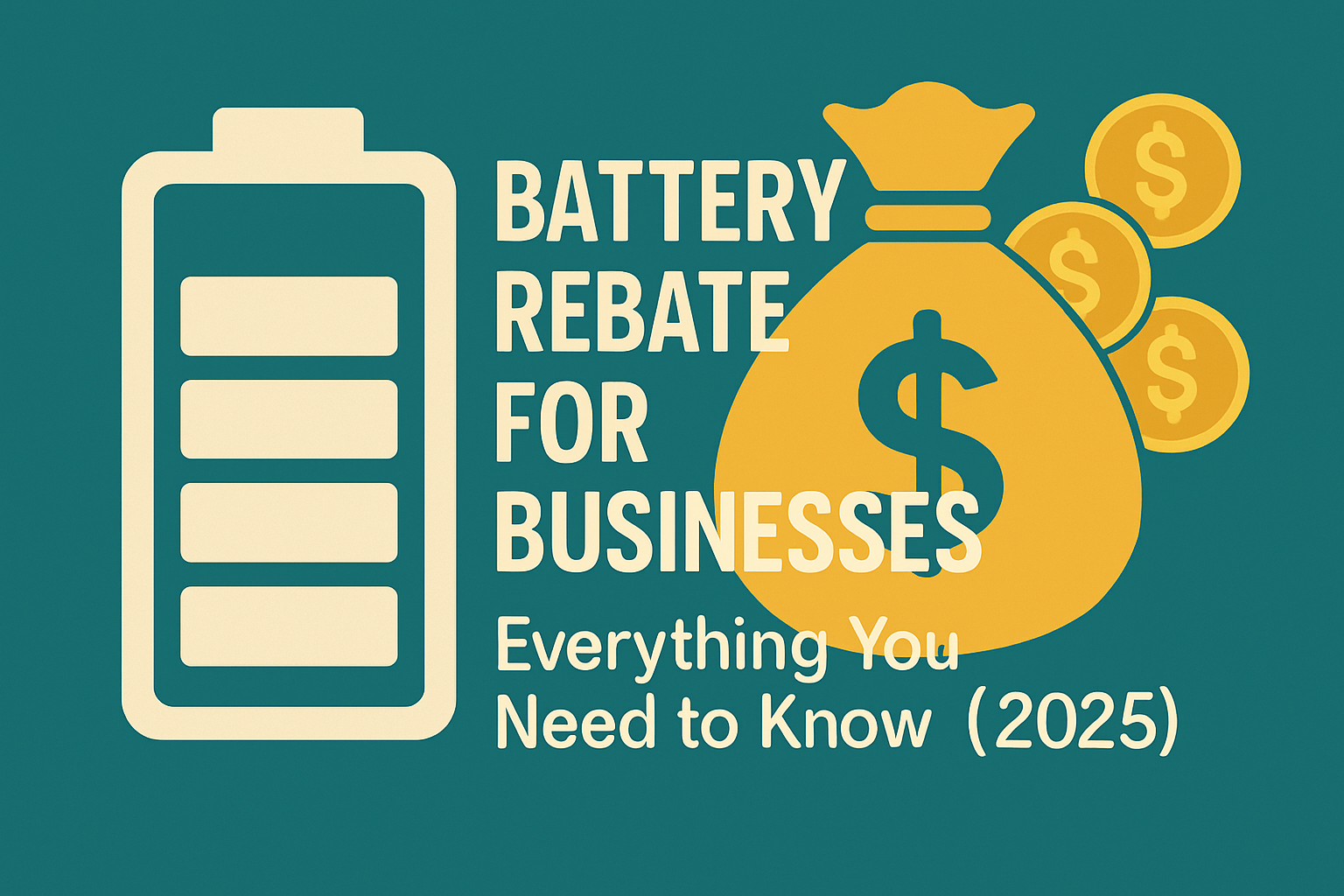Battery Rebate for Businesses: Everything You
Need to Know (2025)
What Is the Battery Rebate for Businesses?
The 2025 Federal Battery Rebate Program now allows Australian businesses to claim up to $344 per usable kWh when installing eligible battery storage systems. The rebate applies to both new installations and expansions of existing systems—with or without solar PV.
How Much Can My Business Save?
- ✅ Up to $344/kWh of usable battery capacity
- ✅ Covers ~30% of system costs
- ✅ Available for battery sizes from 5 kWh to 100 kWh, with rebate capped at 50 kWh usable
Example:
A 50 kWh usable commercial battery could receive up to $17,200 in rebates.
Who Is Eligible?
Currently, eligibility is broad:
- ✔️ Businesses (no turnover or number of employees restrictions)
- ✔️ Also available to community organisations and households
- ✔️ Applies to first-time installations or upgrades
What’s the Typical Payback Period for Commercial Batteries?
When Combined with Solar PV
In many cases, batteries installed alongside solar PV significantly improve energy cost savings, particularly when designed to:
Offset peak demand charges
Shift solar usage to peak grid times
Support critical loads during outages
Typical Payback Period in 2025:
* can be as good as 5 - 7 years for well-sized commercial solar + battery systems
The rate of return can be 17%+ p.a!
Note: Payback varies based on energy usage patterns, tariffs, and participation in programs like VPPs or FCAS.
Other Ways to Monetise Commercial Batteries
Beyond direct bill savings, larger battery systems (often >50 kWh) can unlock additional revenue streams
1. Virtual Power Plant (VPP) Revenue
By joining a VPP, your battery can:
- Export stored energy to the grid during peak demand
- Participate in coordinated dispatch with other batteries
- Receive payments for energy export or grid support service
Potential Earnings:
$200–$500+ per year per 10 kWh (varies by provider and region)
2. FCAS (Frequency Control Ancillary Services)
What Is a Battery for FCAS (in Simple Terms)?
A battery for FCAS is a battery that helps keep the electricity grid stable by responding very quickly when there’s a sudden imbalance between supply and demand.
It’s like the “emergency response system” for the electricity grid.
- The grid runs at a frequency of 50 Hz
- If something goes wrong—like a generator trips or demand spikes—the frequency can drop or rise.
- FCAS helps quickly bring the frequency back to normal to avoid blackouts.
Large batteries can support the National Electricity Market (NEM) by helping balance grid frequency.
Businesses can:
- Register with an aggregator or market participant
- Provide fast-response power during frequency events
- Earn payments for being on standby or providing services
Typical Requirements:
- Generally suited to 100 kWh+ systems with high-performance inverters (no rebate)
- Must pass grid connection technical standards
Potential FCAS Income:
* Can range from $1,000–$3,000/year per 100 kWh, depending on market
conditions
3. Tariff Arbitrage & Peak Shaving
Batteries can charge during cheap off-peak periods or solar generation and discharge during expensive peak hours.
Ideal for:
- Businesses on Time-of-Use (ToU) or demand tariffs
- Sites with high kVA/kW peak charges
Savings Potential:
* $1,000s annually depending on demand profile
Why You Should Act Now
The rebate will decrease each year, and future eligibility criteria may tighten. Demand is also putting pressure on battery supply chains, meaning long lead times or higher costs could return in the near future.
Rebate Declines Each Year
| Install Year |
STCs/kW h |
Rebate/kWh (@ $37/STC) |
| 2025 | 9.3 | $344.10 |
| 2026 | 8.4 | $310.80 |
| 2027 | 7.4 | $273.80 |
| 2028 | 6.5 | $240.50 |
| 2029 | 5.6 | $207.20 |
| 2030 | 4.7 | $173.90 |
Why Expert Design Matters
Commercial battery systems involve:
- Grid connection applications
- AS/NZS 5139 safety compliance
- System sizing based on load/demand profiles
- Business case modelling for ROI and revenue streams
We’re qualified engineers who handle everything from feasibility studies to
installation—ensuring your battery is safe, efficient, and eligible for maximum rebate and future income.
Book Your Free Commercial Battery Assessment
Want to explore:
- How much you can claim?
- Your battery's return?
- What VPP/FCAS income you could earn if you were looking at larger batteries?
Book your free, no-obligation consultation with our engineering team today through [email protected]
Quick FAQ
Q: Can I claim the rebate if I only install a battery, not solar?
✅ Yes. Battery-only installations are eligible.
Q: Do I need to participate in FCAS or VPP to get the rebate?
❌ No, participation is optional—but it can improve ROI.
Q: How much space do I need for a commercial battery?
�Most systems are compact, but indoor/outdoor location and ventilation must be assessed by a professional.
